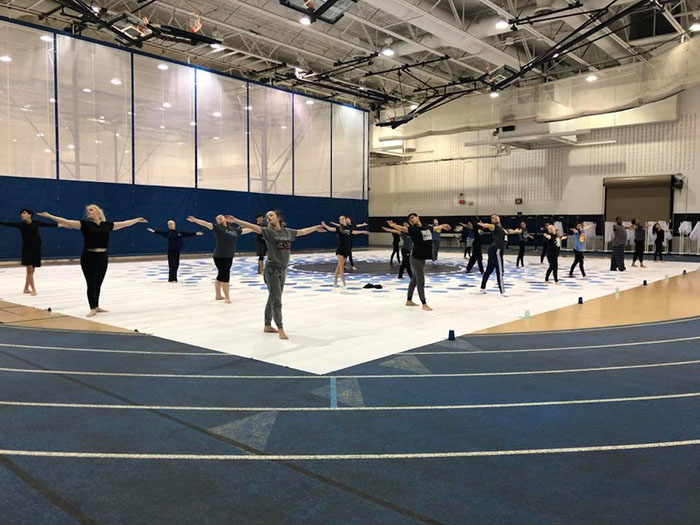Bringing friendship into a performance: winter guard
The DGS Winter Guard prepares to compete at Romeoville High School. The competition is Jan. 26.
On Jan. 26, 2019, 25 participants of the DGS winter guard team quietly pitter-pattered barefoot onto a tarp together at Romeoville High School to execute their first performance in front of a panel of judges. Each member went into ready position and took a deep breath preparing for three minutes full of lyrical dancing, intricate flag tosses and rifles rippling through the air. As they began to move to “The Best,” a performance based on lifelong bonds and friendship, winter guard collectively strove in unison to impress the panel.
Little did this team know that a performance based on friendship would blossom into something that would reflect on themselves as a team.
In November 2018, sophomore Enzo Rovito was given the ultimatum of choosing between winter guard and the cheer team. Choosing guard, Rovito expresses his values of friendship on guard, and what participating means to him.
“I realized [before quitting] the emotion behind guard and how I can tell such important stories with my performances. And I thought about all the people and my friends there, and I couldn’t quit because of them — which is super ironic because our performance theme this year is friendship, and I didn’t quit because of my friends and my bond with them,” Rovito said.
This year Rovito convinced sophomore Ben Tunney, his best friend, to join guard for the first time.
“Guard for me has been really difficult because I have zero dance or spinning experience; I just joined because Enzo made me, and it looked like fun. I had no idea that I was going to have to work so hard. I can run a five-minute mile, but by the end of our show, I can’t breathe. I’ve been a part of swim, cross country, track and band, but I’ve never done something that truly had hundreds of people on their feet screaming. That’s a crazy good feeling,” Tunney said.
Senior Jennifer Lopez is a veteran captain of guard and leads the team and works with her coaches to bring them to success. She works with juniors Oneida Byrd, Helen Weinholtz and senior Colleen Wade collaboratively in order to keep their teammates motivated.
“Probably the most rewarding thing about being a captain is seeing the rest of the team succeeding, not just ourselves and just helping others who may be struggling just as I was once helped, too,” Lopez said.
Lopez didn’t always know she’d be a team leader, as she was once very shy and introverted.
“Guard has also allowed me to grow as a person. When I was younger, I was super shy, and through color guard I have been able to come out of my shell and talk to others more easily. Now, not only am I surrounded by 20 or so friends almost every day, but we also get super close because of it, and I love being supported by so many people,” Lopez said.
According to Weinholtz, obtaining a captain position isn’t easy as it can be quite a stressful and long process.
“There was a pretty long wait between the interviews, and the day it was announced who the section leaders were it was really stressful. I was doubting myself because I knew I wasn’t the best spinner. But I also knew I was more than qualified for the position based on my past leadership experiences,” Weinholtz said.
From someone who isn’t a captain, junior Lizzy Spear finds that performing with her friends furthers her excitement to perform. Spear has been on guard since she was a freshman.
“When I perform, I get this adrenaline rush, and I get to show everyone the hard work and hours we have put into a show, and afterwards when the people in the stands are cheering, I know everything has paid off,” Spear said.
However, with the joy of performing comes the stigmas and negativity people make about guard. Rovito feels as though people don’t understand how hard his team works, and the respect people have for them is reflected when he sees the audience as he performs.
“We practice twice a week, six hours before competition, and have competition for six hours. So 12 hours a week, I’m working my [butt] off. I perform at competitions, and we get praised, but then we go to games to perform and people make jokes and laugh at us. We spend hours working, and we don’t ever get appreciated. We work just as hard as every other team, and I hope everyone sees that so they can do something about it,” Rovito said.
Tunney and Spear think there are stereotypes that make guard underrated at DGS.
“People think it’s nerdy, which is kind of annoying because if it’s something that your friend or your classmate enjoys you shouldn’t put them down for it. For example, last Thursday I was walking to the field house with equipment for practice, and I passed a certain team at school and some guys were laughing and saying “gay” and stuff,” Tunney said.
“[In general] I think a lot of people have a preconceived notion about everyone as soon as they hear what activities they are a part of and the stereotypes that go with them. I think most people just don’t know what guard is at all because there’s not much exposure in social media. No one really takes the time to realize that it’s pretty cool,” Tunney said.
Spear has similar thoughts: “When people see us, they just think of marching band nerds, which isn’t the case. Some people do pay attention and think what we do is really cool, which is amazing. But in my opinion, most people don’t really understand. You can’t generalize all color guard members for being weird because they are a part of color guard,” Spear said.
In actuality Lopez believes guard brings challenges that never really end. “I’m not really sure how to describe the difficulty that color guard can actually bring. I think that things are constantly evolving and new challenges keep coming up no matter how long you have been in it,” Lopez said.
Winter guard has recently been working to place high at upcoming competitions and have a memorable season. Their practice hours are demanding, and their battle scars show it.
“I come home with blisters all over my feet because we aren’t allowed to wear shoes at competitions. I was literally bleeding on our tarp during practice because my feet were so bad,” Rovito said.
“Something I think that most people will never understand is the hours of work, cleaning, fine details, bruised shins, broken fingers, blood and emotion that go into perfecting our shows,” Tunney said.
But hard work pays off, as guard director Megan Schreck thinks that this year the team will have a successful winter season.
“I think we’ll be really successful. We have a really hard-working group and great kids. They work really hard and they’re all friendly with each other …” Schreck said.
Spears adds to this: “I wish everyone knew how hard we worked. Color guard is overlooked and underestimated by a lot of people. We put a lot of time and effort into each season. And it’s not easy for anyone on the team,” Spear said.
But after all the work, Rovito only truly finds one thing important:
“Going out on the competition floor and spinning with my best friends and knowing how much we mean to each other is so much more important than anything else,” Rovito said.
Watch the Blueprint video on winter guard here:



